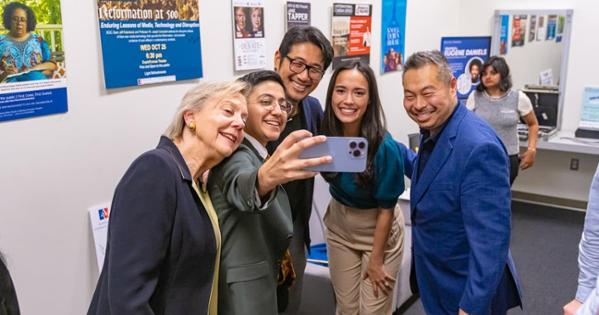A New Chapter for SOC’s AAPI Journalists

AU’s new, first-ever student chapter of the Asian American Journalists Association (AAJA) is working to diversify an industry that is overwhelmingly White and empower the next generation of Asian American and Pacific Islander (AAPI) reporters.
Founded in 1981, AAJA boasts more than 1,600 members across the US and Asia—nearly one-third of whom are college students. AU’s chapter was cofounded by Mina Allen, SOC/BA ’24; Maya Cederlund, SOC/BA ’25; and Genesis Magpayo, SOC/BA ’25.
“It’s hard to feel welcome when you don’t see other journalists that look like you or have similar backgrounds,” says Allen, a journalism and legal studies major. “I came to AU wanting to study journalism but quickly realized that this industry depends on the connections you have. Our mission is to create a space for AAPI students in journalism and media at AU to overcome these barriers.”
AU celebrated the launch of the new student group on September 28, with an American Forum event featuring a trio of AAPI journalists: Paul Cheung, CEO, Center for Public Integrity; Emilie Ikeda, SOC/BA ’16, correspondent, NBC News; and Theodore Kim, SOC/MA ’99, director of career programs, the New York Times. The event—cosponsored by the Kennedy Political Union and the Antiracist Research and Policy Center—was moderated by SOC professors Jane Hall and Aarushi Sahejpal, CAS/BS ’22, SIS/BA ’22, CAS/MS ’23, the chapter’s faculty advisors.
According to a 2023 report from the Pew Research Center, only 3 percent of journalists in the US identify as Asian. Ikeda said that’s why she felt pressure to “blend in and assimilate” early in her broadcasting career.
“What’s been really empowering as I’ve grown older [is that] I’ve been able to surround myself with people who are incredibly accepting of who I am—and I’ve learned to see the value in being different and what it brings to a newsroom.”
Kim said that one of the greatest advantages of diversity in journalism “is that we can cover the world better.” Case in point: the March 2021 murders of six Asian women in Atlanta, all of whom worked in massage parlors.
“That was a really textured story—there were cultural implications, race, crime. What diversity in newsrooms does is allows you to cover that story with nuance and empathy, from all angles, [to give] readers context to develop informed opinions about the facts.”
The panelists also offered career advice to SOC’s budding journalists.
“There are so few of us across the country. A lot of newsrooms are like, if we have one of you, we’re OK. That’s one of the systemic issues we have to grapple with—but the field of journalism is changing,” Cheung said. “Legacy media, startups, nonprofit [newsrooms] need your talent. Pick a place that will allow you to do everything . . . and pursue your passion.”
Added Kim: “This is the time to explore what excites you. The thing that’s going to get you through is that you love what you do, and you know in your heart that it’s impactful.”
Watch this American Forum on NBC4 Washington at the following times:
- Tuesday, October 17, 8 p.m.
- Wednesday, October 18, 9 p.m.
- Thursday, October 19, 8 p.m.
- Friday, October 20, 10 p.m.
- Saturday, October 21, and Sunday, October 22, 6 a.m., 4 p.m., 8 p.m., and 10 p.m.
